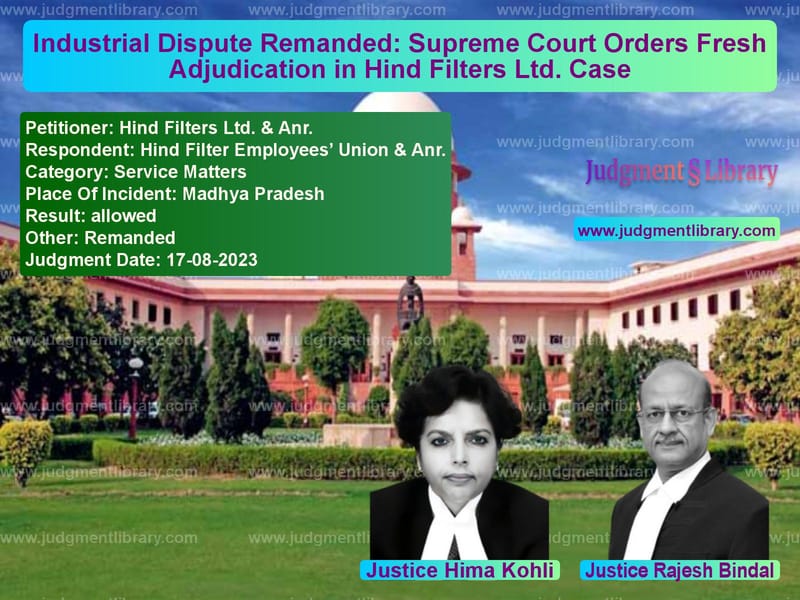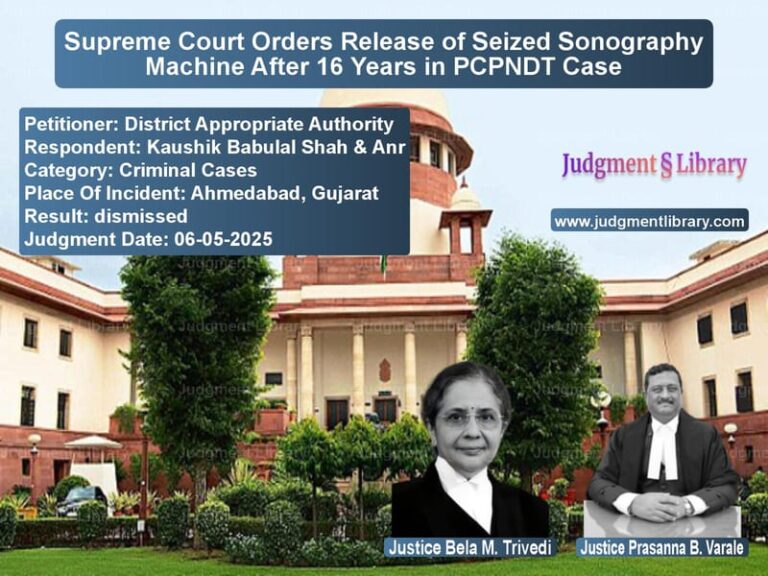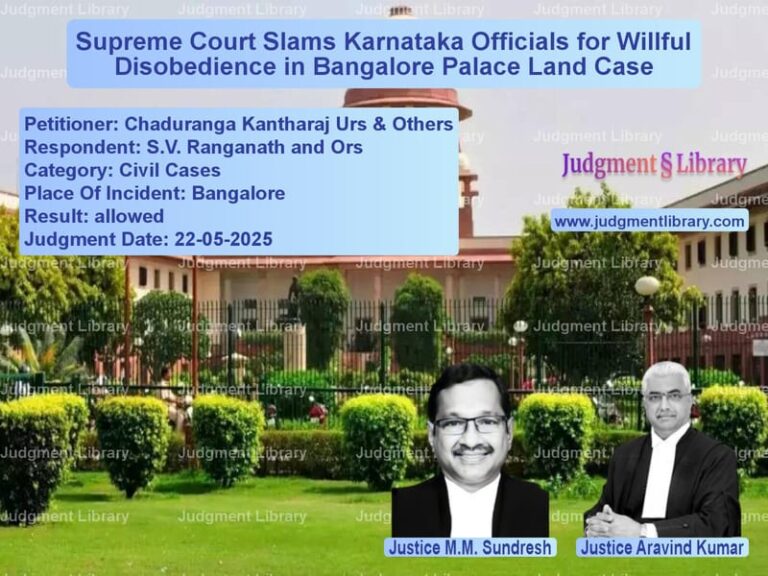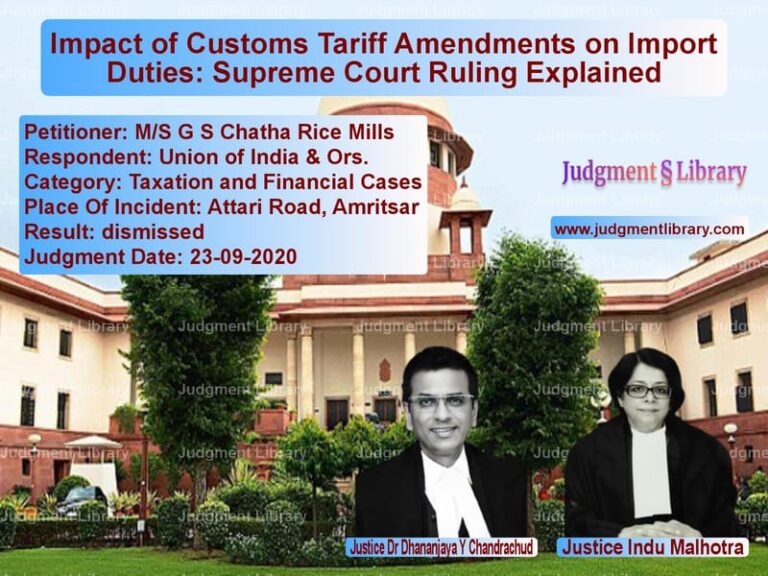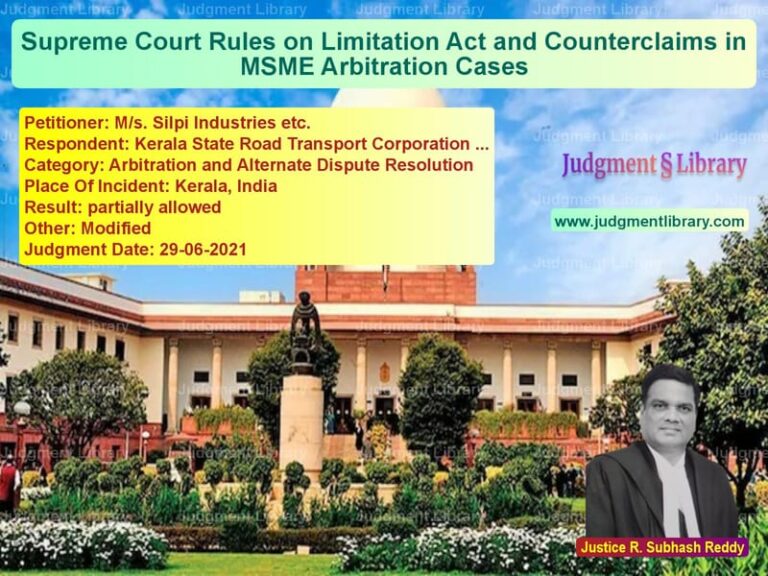Industrial Dispute Remanded: Supreme Court Orders Fresh Adjudication in Hind Filters Ltd. Case
The case of Hind Filters Ltd. & Anr. vs. Hind Filter Employees’ Union & Anr. is a significant industrial dispute concerning the jurisdiction of the Labour Court and the rights of employees under the Industrial Disputes Act, 1947. The Supreme Court ruled that the matter must be remanded back to the Labour Court for fresh adjudication, setting aside the previous orders of the High Court and Labour Court.
Background of the Case
The dispute began when Hind Filters Ltd. sought to retrench 45 workmen in 2000 under Section 25-N of the Industrial Disputes Act, 1947. The Labour Commissioner denied the request. Subsequently, the employees raised demands for increased wages and other benefits, leading to a reference of the dispute to the Labour Court in 2002.
The Labour Court ruled in favor of the employees in 2006. The management challenged the decision in the High Court, arguing that since their establishment employed more than 100 workers, the case should have been referred to the Industrial Tribunal instead of the Labour Court. The High Court allowed the management to seek correction of factual errors but later reversed this allowance, restricting the management’s right to present further evidence.
Arguments by the Petitioner (Hind Filters Ltd.)
The management presented the following key arguments:
- The Labour Court lacked jurisdiction because the company employed more than 100 workmen, meaning the dispute should have been referred to the Industrial Tribunal.
- They had evidence, including records from the Employees State Insurance Corporation and Life Insurance Corporation, showing more than 100 workers were employed.
- The High Court initially granted them liberty to correct the factual error but later unjustly restricted their ability to submit further evidence.
- The error in jurisdiction was fundamental and should be rectified through proper adjudication.
Arguments by the Respondents (Hind Filters Employees’ Union)
The employees’ union countered with these arguments:
- The dispute had been ongoing for over two decades, and many workers had retired or passed away.
- The Labour Court’s jurisdiction was correctly established based on the available evidence at the time.
- Allowing the management to reopen the issue would unfairly delay justice for the workers.
Key Observations by the Supreme Court
The Supreme Court analyzed the jurisdictional issue and noted:
“In this light, the stand taken by the appellants-Management is that in the establishment of the appellants-Management, there were more than 100 workmen, hence, reference of the dispute to the Labour Court was without jurisdiction and consequently, any award passed by the Labour Court is not sustainable.”
Further, the Court emphasized that the management provided substantial documentary evidence proving the presence of over 100 employees during the relevant period. The Court noted:
“The documents sought to be produced by the appellants-Management go to the root of the case on the question of jurisdiction of the Labour Court to adjudicate the matter.”
Supreme Court’s Judgment
Based on these findings, the Supreme Court ruled:
- The previous orders of the High Court and Labour Court were set aside.
- The case was remanded back to the Labour Court for fresh adjudication.
- The management was allowed to submit its evidence regarding the number of employees.
- The employees’ union would have the opportunity to cross-examine witnesses and present counter-evidence.
- The Labour Court was directed to conclude the matter within six months.
- The management was ordered to deposit Rs. 1,00,000 with the Labour Commissioner, which would be distributed equally among the workers.
Conclusion
This ruling reinforces the importance of proper jurisdiction in labor disputes. It also underscores the necessity of allowing all relevant evidence to be considered before reaching a final decision. The Supreme Court’s directive to resolve the matter within six months ensures that the prolonged dispute moves toward a timely resolution, benefiting both the workers and the management.
Read also: https://judgmentlibrary.com/supreme-court-upholds-dismissal-of-army-personnel-for-overstaying-leave/
Petitioner Name: Hind Filters Ltd. & Anr..Respondent Name: Hind Filter Employees’ Union & Anr..Judgment By: Justice Hima Kohli, Justice Rajesh Bindal.Place Of Incident: Madhya Pradesh.Judgment Date: 17-08-2023.
Don’t miss out on the full details! Download the complete judgment in PDF format below and gain valuable insights instantly!
Download Judgment: hind-filters-ltd.-&-vs-hind-filter-employee-supreme-court-of-india-judgment-dated-17-08-2023.pdf
Directly Download Judgment: Directly download this Judgment
See all petitions in Employment Disputes
See all petitions in Disciplinary Proceedings
See all petitions in Judgment by Hima Kohli
See all petitions in Judgment by Rajesh Bindal
See all petitions in allowed
See all petitions in Remanded
See all petitions in supreme court of India judgments August 2023
See all petitions in 2023 judgments
See all posts in Service Matters Category
See all allowed petitions in Service Matters Category
See all Dismissed petitions in Service Matters Category
See all partially allowed petitions in Service Matters Category

